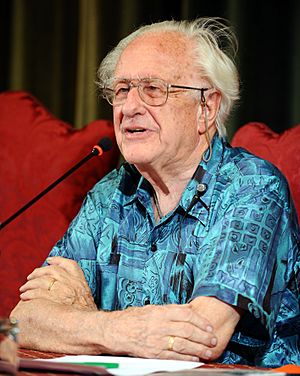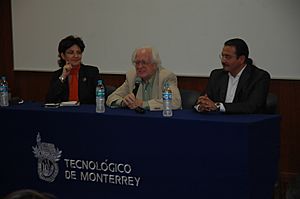Johan Galtung facts for kids
Quick facts for kids
Johan Galtung
|
|
|---|---|

Galtung in 2012
|
|
| Born | 24 October 1930 Oslo, Norway
|
| Died | 17 February 2024 (aged 93) Bærum . Norway
|
| Alma mater | University of Oslo |
| Known for | Principal founder of peace and conflict studies |
| Awards | Right Livelihood Award (1987) |
| Scientific career | |
| Fields | Sociology, peace and conflict studies |
| Institutions | Columbia University, University of Oslo, Peace Research Institute Oslo (PRIO) |
| Founder and Director of Peace Research Institute Oslo | |
| In office 1959–1969 |
|
| Succeeded by | Asbjørn Eide |
Johan Vincent Galtung (born October 24, 1930 – died February 17, 2024) was a Norwegian sociologist. A sociologist studies how people live together in groups and societies. Galtung is best known as the main founder of a field of study called peace and conflict studies. This field looks at how to prevent wars and solve disagreements peacefully.
He started the Peace Research Institute Oslo (PRIO) in 1959. This was the first center dedicated to peace research. He was its first leader until 1970. He also created the Journal of Peace Research in 1964. This was the first academic magazine focused on peace studies.
In 1969, Galtung became the world's first professor of peace and conflict studies. This was at the University of Oslo. He later taught at many other universities around the world. From 1993 to 2000, he was a special professor of Peace Studies at the University of Hawaii.
Contents
Early Life and Education
Johan Galtung was born in Oslo, Norway. He studied mathematics at the University of Oslo and earned a degree in 1956. A year later, he completed his PhD in sociology at the same university. He later received many honorary doctorates from universities worldwide.
His father and grandfather were both doctors. His mother was from central Norway, and his father was from the south. Galtung was married twice. He had two children with his first wife, Ingrid Eide. He had two more children with his second wife, Fumiko Nishimura.
Galtung grew up during World War II. Norway was occupied by the Germans. When he was 12, he saw his father arrested by the Nazis. This experience deeply affected him. By 1951, he was already working for peace. He chose to do 18 months of community service instead of military service. He wanted his service to help promote peace.
Galtung passed away in Bærum, Norway, on February 17, 2024. He was 93 years old.
Career in Peace Studies
After finishing his PhD, Galtung moved to New York City. He taught sociology at Columbia University. In 1959, he returned to Oslo. There, he founded the Peace Research Institute Oslo (PRIO). He was the director of PRIO until 1969.
In 1964, Galtung helped PRIO start the Journal of Peace Research. This was the first academic journal about peace studies. In the same year, he helped create the International Peace Research Association. This group connects peace researchers globally. In 1969, he became a professor at the University of Oslo. He taught peace and conflict research there until 1978.
Galtung also held visiting professor positions at many other universities. These included places like Santiago, Chile, the United Nations University in Geneva, and Princeton University. In 2014, he became the first Tun Mahathir Professor of Global Peace in Malaysia.
A famous economist, Kenneth Boulding, once said that Galtung's work was so vast, it was hard to believe one person created it all. Galtung was a member of the Norwegian Academy of Science and Letters. In 1993, he co-founded TRANSCEND. This is a network focused on peace, development, and the environment. In 1987, he received the Right Livelihood Award. This award is sometimes called the "Alternative Nobel Prize."
Key Ideas and Contributions
Understanding Conflict: The Conflict Triangle
In 1969, Galtung wrote an important paper called "Violence, Peace and Peace Research." In this paper, he introduced his idea of the Conflict Triangle. This idea helps us understand different types of violence in conflicts.
He said that violence can be seen in three ways:
- Direct violence: This is physical harm, like fighting or war.
- Structural violence: This is when social systems or structures cause harm. For example, poverty or unfair laws that hurt certain groups.
- Cultural violence: This is when culture or beliefs make direct or structural violence seem normal or right. For example, ideas that say one group is better than another.
Galtung believed that true peace means there is no violence of any kind. When all three types of violence are present, a conflict becomes very strong and hard to solve. When these three types of violence are absent, peace can grow.
Building Lasting Peace
Galtung was also the first to talk about "peacebuilding." He believed that to have lasting peace, we need systems that deal with the root causes of conflict. These systems should help local communities manage disagreements and solve problems peacefully.
Galtung worked as an advisor for many international groups. He was also part of several important research councils. From 2004 until he died, he was a member of the Advisory Council for the Committee for a Democratic UN.
Selected Awards and Recognitions
- Right Livelihood Award, 1987
- First recipient of the Humanist Prize of the Norwegian Humanist Association, 1988
- Jamnalal Bajaj International Award for Promoting Gandhian Values, 1993
- Brage Prize, 2000 (for his autobiography)
- First Morton Deutsch Conflict Resolution Award, 2001
- Honorary Prize of the Norwegian Sociological Association, 2001
- Augsburg Golden Book of Peace, 2006
- Member of the Norwegian Academy of Science and Letters
- Erik Bye Memorial Prize, 2011
Selected Works
Johan Galtung wrote more than a thousand articles and over a hundred books. Here are a few of his important works:
- Statistisk hypotesepröving (Statistical hypothesis testing, 1953)
- Gandhis politiske etikk (Gandhi's political ethics, 1955, with philosopher Arne Næss)
- Violence, Peace and Peace Research (1969)
- Peace: Research – Education – Action (1975)
- Europe in the Making (1989)
- Peace By Peaceful Means: Peace and Conflict, Development and Civilization (1996)
- Johan uten land. På fredsveien gjennom verden (Johan without land. On the Peace Path Through the World, 2000, his autobiography)
- 50 Years: 100 Peace and Conflict Perspectives (2008)
Images for kids
See also
 In Spanish: Johan Galtung para niños
In Spanish: Johan Galtung para niños
 | Emma Amos |
 | Edward Mitchell Bannister |
 | Larry D. Alexander |
 | Ernie Barnes |



